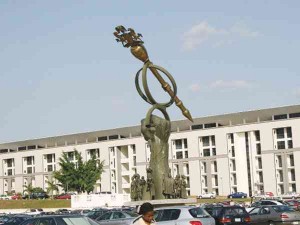N5000 Note is illegal – Lawmakers Tell Sanusi
The members of the National Assembly, upon resumption yesterday, called the Central Bank governor to order over plans to review the National currency without their input. Citing Section 4(1 and 2) of the 1999 Constitution and Section 8(2) of the CBN Act of 2007, the Senate called the plans illegal and called on the CBN and Presidency to abandon the plans.
Senator Ita Enang (Akwa Ibom North) who leed the motion argued that although the CBN possessed statutory rights for the printing of currency notes and minting of coins among others, and is allowed to issue denominations and fractions with the approval of the President on the recommendation of the board, this does not stop the supeervisory powers of the legislature.
He said, “The power being granted by the Legislature is subject to the supervisory powers of the Legislature which granted or donated the powers under the Act if the exercise of the powers is contrary to good economic conscience and the wellbeing of the people and the national economy.
“The introduction of the said N5000 note and the withdrawal of notes, conversion of some to coins and general redenomination of the naira has the ultimate effect of devaluing the naira, making lower currencies to be coined, almost non-value monies for transactions and subtly yield to the off-demand of certain international financial institutions for the devaluation of our currency.
“Section 4(1 and 2) of the constitution vests the legislative powers of the Federal Republic of Nigeria in the National Assembly to make laws for the peace and good governance of the federation or any part thereof; whereas this policy of the bank on the Naira may not lead to good economic and monetary governance of Nigeria requiring re-examination by the legislature.”
Enang also stated that the N5000 note would defeat the cashless policy.
He said, “In cashless economies, high bills or currency notes such as the proposed N5000 is not required as transactions are conducted from the payer to the payee’s accounts without any need for physical exchange or handling of cash by any of the parties.
“The convenience of carrying large amount of cash by way of large denominations now being proposed does not at all arise since large volume transactions as under the Money Laundering Act are to be conducted cashless through bank accounts of the transacting parties.”
Senate deputy leader Abdul Ningi said the policy was unacceptable to Nigerians and there would be no need for a public hearing as Nigerians had spoken very clearly on the issue.
Senate President David Mark said, “If Nigerians say that they don’t want anything, I think they deserve to be listened to. I have listened to the arguments of those supporting it. Their arguments are not convincing. They are theoretical and do not address the problems in practical terms.
“The disadvantages of introducing the N5000 far outweigh that of not introducing it. There is no urgent need for us to take this now.”









